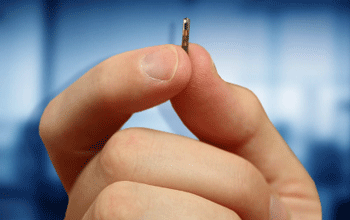When a Wisconsin-based technology company invited its employees to have chips implanted in their fingers, it signaled a massive change in our society.
______________________________
By Jeffrey Cole
It sounds like a particularly chilling episode of Netflix’s future-phobic series, Black Mirror: as of August first, employees at Three Square Market, a technology company in River Falls, Wisconsin, can choose to have a tiny chip the size of a grain of rice implanted in their fingers. (Actually, this does resemble an episode of Black Mirror.)
 The benefits of having this finger chip are real: employees no longer need ID or keys at work, and they can buy lunch from the company cafeteria without cash or credit cards.
The benefits of having this finger chip are real: employees no longer need ID or keys at work, and they can buy lunch from the company cafeteria without cash or credit cards.
The decision whether to have the chip placed in the finger is elective; on the first day, 50 of 80 employees did it.
The fact that so many people at Three Square Market agreed to getting the chip implanted — without a significant understanding of the potential social and medical ramifications — means that many more companies will offer this sort of chip. In addition to a full-proof way to know for sure who a person is, “chipping” cuts down on keys, magnetic cards, and other security items that people can lose, and potentially reduces a company’s need for security personnel while also improving security.
It is easy to see a future in five years when millions of Americans could have chips in their bodies. Implantable computers mean no more driver’s licenses, credit cards, car or house keys, quick access through airport security and gates, card and teller-free banking and much, much more. This new kind of computing also means that cars will become almost impossible to steal, while credit card and other fraud come close to vanishing.
Technologically, chipping is a utopia.
Privacy-wise, it is either the beginning of a secure, frictionless world or the beginning of a nightmare.
In our 17-year project, “Surveying the Digital Future,” we have seen American concerns about online privacy decline. In 2001, for example, sixty-six percent of Americans were very or extremely concerned about the privacy of their personal information when shopping or buying online, but that number fell to forty-eight percent in 2016.
Despite this general trend, I am still shocked that so many Three Square Market employees agreed to a technological invasion of their bodies. The company swears there was no pressure to participate in the program, but it’s difficult to know whether peer pressure at the company played a part.
How long will chipping be optional?
With such a high percentage of Three Square Market employees volunteering for the program, it’s easy to imagine a near future in which the company argues that — with only a few more participants — security can be guaranteed, costs lowered, and inconveniences eliminated. In other words, the program could quickly move from voluntary to mandatory.
Such a move invokes horrible scenarios of corporations strapping down their employees and chipping them against their wills. As compelling an image as that makes for science-fiction movies, it is far more likely that employees who chose not to get chipped will no longer be able to work at the company. The argument is obvious: a few cannot slow down the efficiency and productivity of the rest.
______________________________________________________________________________________________
The fact that so many people at Three Square Market agreed to getting the chip implanted — without a significant understanding of the potential social and medical ramifications — means that many more companies will offer this sort of chip. Technologically, chipping is a utopia. Privacy-wise, it is either the beginning of a secure, frictionless world or the beginning of a nightmare.
_______________________________________________________________________________________________
We eagerly agree to plant chips in our pets in case they get lost, so why not get them ourselves?
The nightmare scenario is that the process will be voluntary… unless you want a job: people who don’t want their bodies to become hosts for computer chips will not be able to find employment.
If chipping is harmless, increases security for everyone, reduces crime and makes life more convenient, then what’s the big deal? After all, don’t our smart phones and the navigation systems in our cars track everything we do? Phones can be stolen, giving a thief access to most of our personal lives. And, in the words of Sun Microsystems co-founder Scott McNealy, hasn’t it been true for at least ten years that, “You have zero privacy anyway: get over it!” Given all this, doesn’t the chip preserve our security and privacy?
Yes, but this comes at a high cost: the sanctity of our bodies. Chipping goes further than a TSA search. Could we someday see humans hacked the way machines and other devices are hacked?
I look at the chip implanting at Three Square Marketing with such intense focus because I believe that this is a turning point in the war between convenience and privacy. What is at stake is our right to opt out of an efficient and soulless future.
In a future where artificial intelligence gets smarter and smarter, cars drive themselves, and devices both know more about us and continue to do more for us, we will look back at the first of August in River Falls, Wisconsin as the time and place where an important line was crossed.
____________

Jeffrey Cole is the founder and director of The Center for the Digital Future at USC Annenberg.
See all Analysis columns.
August 31, 2017

